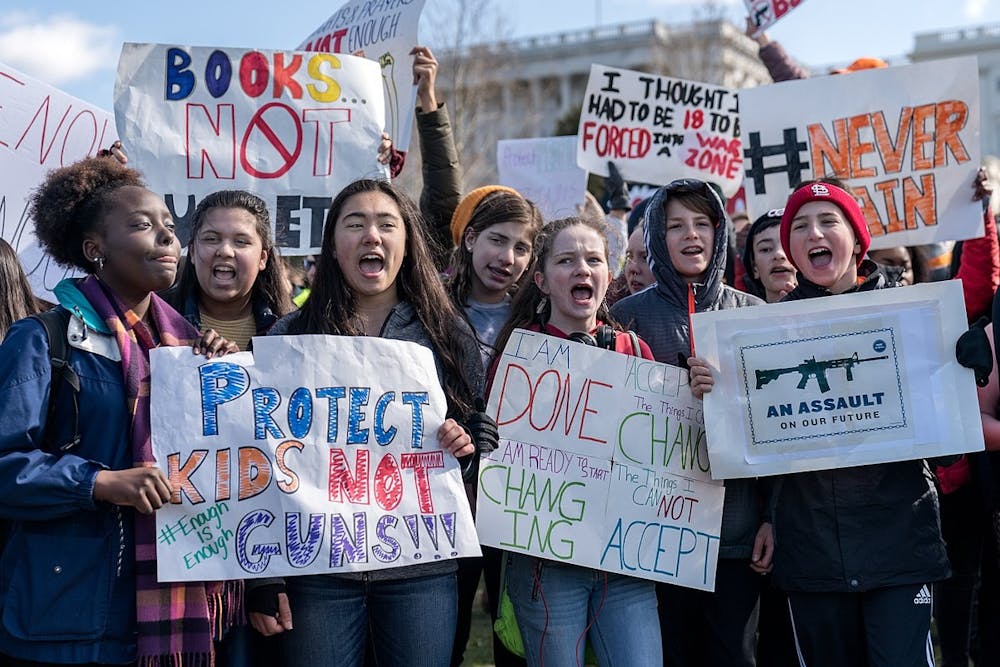In 2020 alone 45,222 Americans lost their lives to a public health crisis plaguing this nation. No, they did not lose their lives to COVID-19. They died from gun-related injuries. Sadly, with each successive year, the percentage of deaths resulting from gun violence has only continued to increase. In fact, in 2022, gun violence was the leading cause of death for children in America, surpassing the number of deaths caused by vehicular accidents. What makes this fact even more unfortunate is that these deaths are all entirely preventable. Gun control is largely framed as a political issue. However, we must recognize gun violence — and the rise in mass shootings — as a pressing public health crisis in need of immediate government funding and attention. Our legislators must commit to addressing gun violence as the disease it is and work to end this public health crisis.
Research suggests we are better off treating this phenomenon as a public health epidemic than as a policing problem to lower gun violence rates. Treating gun violence as a public health crisis would mean diverting more funds toward solution based-research and investing in social determinants of health. Social determinants of good health include access to affordable housing and food, economic stability, access to healthcare and comprehensive education. Public health problems are closely linked to social determinants of health because poor social determinants such as poverty, food insecurity and a lack of educational opportunities can predict lower health outcomes and increase the likelihood of encountering gun violence.
For 25 years, top health organizations have not had the necessary government funds for gun violence injury-related research. This extensive gap in research was due to the 1996 Dickey Amendment, which banned the allocation of government funding for gun control advocacy at the insistence of the National Rational Association. This funding freeze also affected the hiring of doctoral students to pursue gun violence research, and in 2017, one estimate found there were only 30 gun policy researchers in the United States. It was not until 2020 that the Dickey Amendment was repealed.
Research is an important component of understanding any disease, and it is helpful for debunking commonly held misconceptions including the misconception that owning a gun makes us safer. Research actually suggests that owning a gun significantly increases the chances someone in your household will die of a gun injury. While the end of the Dickey Amendment means more research will be conducted on gun safety, there are more challenges ahead. It will take years for gun violence research to catch up to the amount of studies and funding available for research on other leading causes of death.
In addition, we can not address gun violence as a public health epidemic without also addressing the mental health crisis. While it is not the case that mental health is the driving factor behind mass violence — like Republicans might claim it is — most gun injuries in America are suicides. Research suggests that states with the highest suicide rates are also the states with the highest gun ownership and less restrictions on gun purchases. Increasing access to mental health treatment in addition to passing common sense gun regulation is the only way to significantly decrease the number of lives lost to gun violence.
While Republican leaders work to ban books, race and gender curriculum, access to free school lunches, access to abortion, sex education and drag shows, people are dying from unregulated guns in this country. We must stop entertaining conservative, libertarian and centrist arguments about personal freedoms when we are weighing someone’s right to own a gun against someone’s right to life. Each congressperson who continues to oppose gun control and funding that improves social determinants of health has American blood on their hands.
If we know that a devastating health outcome which affects millions a year is entirely preventable, why would we not do everything in our power to stop it? We as University students have all felt the life-changing effects of gun violence on Grounds. As current undergraduate researchers and future scholars, we know that research on public health crises saves lives. While we mourn the lives lost to gun violence, we should continue to honor their lives by advocating for greater gun control restrictions and calling attention to this preventable public health epidemic.
Yssis Cano-Santiago is an Opinion Columnist who writes on Health, Technology and the Environment for The Cavalier Daily. She can be reached at opinion@cavalierdaily.com.
The opinions expressed in this column are not necessarily those of The Cavalier Daily. Columns represent the views of the authors alone.







